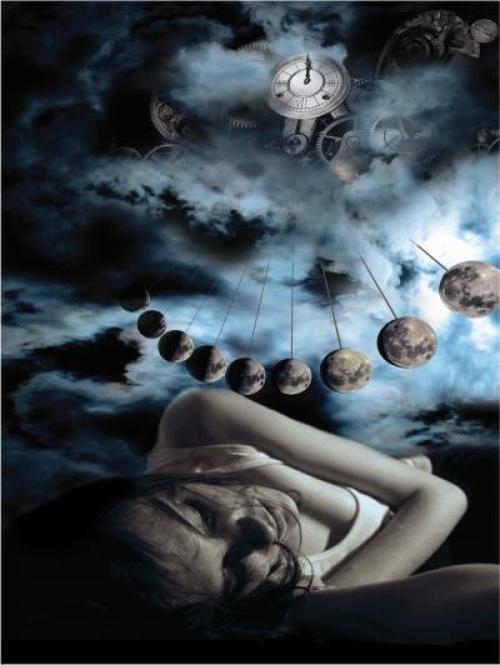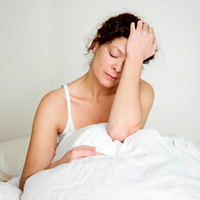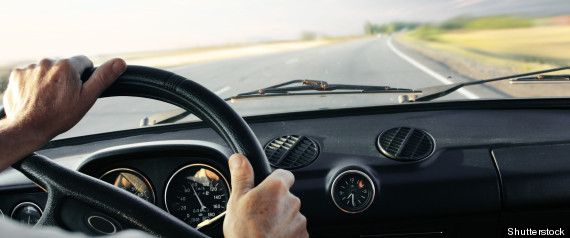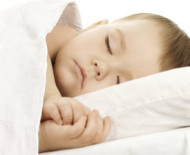Bad Night’s Sleep? The Moon Could Be to Blame
July 25, 2013 — Many people complain about poor sleep around the full moon, and now a report appearing in Current Biology, a Cell Press publication, on July 25 offers some of the first convincing scientific evidence to suggest that this really is true. The findings add to evidence that humans — despite the comforts of our civilized world — still respond to the geophysical rhythms of the moon, driven by a circalunar clock. “The lunar cycle seems to influence human sleep, even when one does not ‘see’ the moon and is not aware of the actual moon phase,” says Christian Cajochen …
Kids’ Sleep Patterns Affected by Electronic Media Time and Media Presence in the Bedroom
July 25, 2013 — Children’s sleep disruption is worse with increased time spent watching TV or playing on the computer, finds research in Biomed Central’s open access journal BMC Public Health. The greater the e-media use was at the start of the study, the shorter the sleep duration and the later the bedtime was eighteen months later. The academics suggest that where children are struggling to sleep, or are tired, their media habits should be taken into consideration. The amount of sleep children get has a direct bearing on their performance in school and their mental and physical health. Snap shot studies …
Snoring Is No Laughing Matter
Millions of Americans have obstructive sleep apnea and don’t know it. But the disorder can have serious health consequences. By Dr. Sanjay Gupta If you snore at night and feel drowsy all day, then you may be one of 18 million Americans who have obstructive sleep apnea (OSA). Most people with the sleep disorder don’t know they have it, but left untreated OSA can lead to serious complications. “People with sleep apnea have been shown to be at a higher risk for cardiovascular diseases, particularly hypertension, stroke and diabetes,” said Thomas Roth, MD, director of the Center for Sleep Disorders and Research …
Sleep Apnea And Strokes
Check Out This Video Which Discusses the Obstructive Sleep Apnea Connection with Strokes. http://www.kutv.com/health/features/check-health/stories/vid_423.shtml By Carla Roberts (KUTV) A few weeks ago, 78-year-old Malan Jackson suffered a stroke. âI suddenly felt confused in my head.â Jackson went to the emergency room and is now on the mend. Aside from therapy, doctors recommended that Malan undergo a sleep study to see if he had sleep apnea. Experts at Utah Valley Regional Medical Center are conducting a study to further understand a possible link between sleep apnea and strokes. Sleep apnea is a type of sleep disorder where a person stops breathing during …
Snoring, sleep apnea can kill
By Philip ChuaCebu Daily News 12:15 pm | Monday, July 15th, 2013 Read more: http://newsinfo.inquirer.net/445233/snoring-sleep-apnea-can-kill#ixzz2ZEv4KtRB FOR years physicians have suspected that snoring is generally associated with sleep apnea, and sleep apnea was linked to sudden cardiac death. Unlike heart attack not related to sleep apnea, which could occur anytime of the day, cardiac death from sleep apnea happens while the patient is asleep. In an article in June 11, 2013 in the Journal of American College of Cardiology, Dr. Apoor Gami, a cardiac electrophysiologist at the Midwest Heart Specialists-Advocate Medical Group in Elmhurst, Ilinois, and leader of the study, confirmed that link. …
When is snoring sleep apnea?
Please read about the symptoms of sleep apnea. An overnight sleep study (polysomnogram) done either at a sleep lab or at home will give you the diagnosis. http://www.philly.com/philly/health/20130714_When_is_snoring_sleep_apnea_.html POSTED: July 14, 2013 Q:I snore like a freight train every night, or so says my wife of 50 years. She’s concerned I have sleep apnea. Should I see a doctor about it? A: Snoring occurs on a spectrum. While some people have occasional, quiet snoring, others experience loud, habitual snoring nearly every night or on most nights. In the frequent-snoring group, snoring may be an indication of an underlying sleep disorder called obstructive …
Sleep Apnea Patients More Likely To Fail Simulated Driving Test, Study Says
Here’s another reason to make sure your snoring isn’t sleep apnea. According to a new study, people with sleep apnea — a condition where a person stops breathing for periods of time throughout the night, leading to disrupted sleep — were more likely to fail a driving simulator test and also reported falling asleep while driving more than people without the sleep condition. The study, conducted by researchers from the the University Hospital in Leeds and presented at the Sleep And Breathing Conference in Berlin, included two parts. The first part tested the driving ability of 133 people with untreated …
Dental sleep medicine classes reach across the border
Tufts inclusion of dental sleep medicine was almost two decades after the inaugural 1991 meeting of the American Academy of Dental Sleep medicine. May 29, Sleep apnea The field of dental sleep medicine was barely out of its infancy when Tufts faculty realized the importance of training students to screen, diagnose and treat sleep disorders. In 2009, the school became the first in the U.S. to incorporate dental sleep medicine into its curriculum. But Americans aren’t the only ones whose nights are upended by conditions such as obstructive sleep apnea, which not only deprive their sufferers of much-needed rest but …
Helpful Tips for Sleeping Better This Summer
June 27, 2013 By Dr. Mercola If you’re like most Americans, you’re likely not getting enough sleep. Nearly 41 million US adults are sleeping just six hours or less each night, which recent research has linked to an increased risk of chronic inflammation and heart disease in women.1 Over the course of the five-year long study,2 women who slept poorly—quantified as sleeping less than six hours per night—had 2.5 times higher increases in inflammation levels compared to men who slept poorly. As reported by the featured article:3 “Researchers speculated that the gender difference may be due to lower estrogen levels in …
Children’s Sleep in Their Genes?
Children’s Sleep in Their Genes? How long kids sleep may be genetic, study finds By Children’s Health Team | 6/5/13 11:17 a.m. Your toddler’s sleep habits may be affected by both genetics and environment. Genes play an important role in how long your child sleeps at night, and environmental factors influence daytime naps, says a new study. But this doesn’t mean your child’s sleep habits are out of your control, researchers add. Jyoti Krishna, MD, did not take part in the study but treats pediatric sleep disorders at Cleveland Clinic. He says some children just don’t need as much sleep as others. “If the child isn’t …








